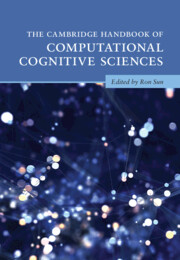Book contents
- The Cambridge Handbook of Computational Cognitive Sciences
- Cambridge Handbooks in Psychology
- The Cambridge Handbook of Computational Cognitive Sciences
- Copyright page
- Contents
- Preface
- Contributors
- Part I Introduction
- Part II Cognitive Modeling Paradigms
- Part III Computational Modeling of Basic Cognitive Functionalities
- 11 Computational Models of Categorization
- 12 Computational Cognitive Neuroscience Models of Categorization
- 13 Models of Inductive Reasoning
- 14 Analogy and Similarity
- 15 Mental Models and Algorithms of Deduction
- 16 Computational Models of Decision Making
- 17 Computational Models of Skill Acquisition
- 18 Computational Models of Episodic Memory
- 19 Computational Neuroscience Models of Working Memory
- 20 Neurocomputational Models of Cognitive Control
- 21 Computational Models of Animal and Human Associative Learning
- 22 Computational Cognitive Models of Reinforcement Learning
- Part IV Computational Modeling in Various Cognitive Fields
- Part V General Discussion
- Index
- References
14 - Analogy and Similarity
from Part III - Computational Modeling of Basic Cognitive Functionalities
Published online by Cambridge University Press: 21 April 2023
- The Cambridge Handbook of Computational Cognitive Sciences
- Cambridge Handbooks in Psychology
- The Cambridge Handbook of Computational Cognitive Sciences
- Copyright page
- Contents
- Preface
- Contributors
- Part I Introduction
- Part II Cognitive Modeling Paradigms
- Part III Computational Modeling of Basic Cognitive Functionalities
- 11 Computational Models of Categorization
- 12 Computational Cognitive Neuroscience Models of Categorization
- 13 Models of Inductive Reasoning
- 14 Analogy and Similarity
- 15 Mental Models and Algorithms of Deduction
- 16 Computational Models of Decision Making
- 17 Computational Models of Skill Acquisition
- 18 Computational Models of Episodic Memory
- 19 Computational Neuroscience Models of Working Memory
- 20 Neurocomputational Models of Cognitive Control
- 21 Computational Models of Animal and Human Associative Learning
- 22 Computational Cognitive Models of Reinforcement Learning
- Part IV Computational Modeling in Various Cognitive Fields
- Part V General Discussion
- Index
- References
Summary
Analogy is a core cognitive capacity encompassing basic similarity (“this is like that”), relational similarity (proportional analogies of the form A:B::C:x), and complex system mappings, in which the elements of one situation are structurally aligned with the elements of another. The latter permits complex inferences from a known source situation to a less familiar target situation. Because of its centrality in human thinking, analogy has been the subject of numerous computational modeling efforts. Models of similarity come from multiple traditions in cognitive science, including associationist approaches (such as connectionist models), “traditional” symbolic approaches (such as graph matching and production systems), and hybrid symbolic/connectionist approaches. This chapter reviews and evaluates several models from these various approaches in terms of their ability to simulate basic similarity, relational similarity, and system mapping.
Information
- Type
- Chapter
- Information
- The Cambridge Handbook of Computational Cognitive Sciences , pp. 451 - 473Publisher: Cambridge University PressPrint publication year: 2023
References
Accessibility standard: Unknown
Why this information is here
This section outlines the accessibility features of this content - including support for screen readers, full keyboard navigation and high-contrast display options. This may not be relevant for you.Accessibility Information
- 2
- Cited by
